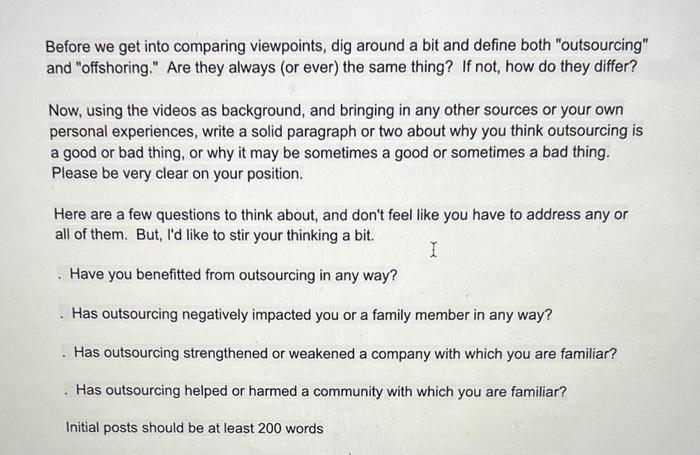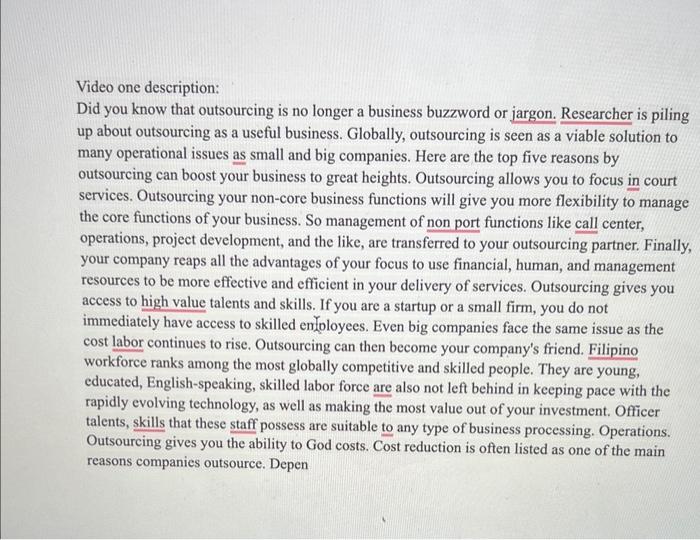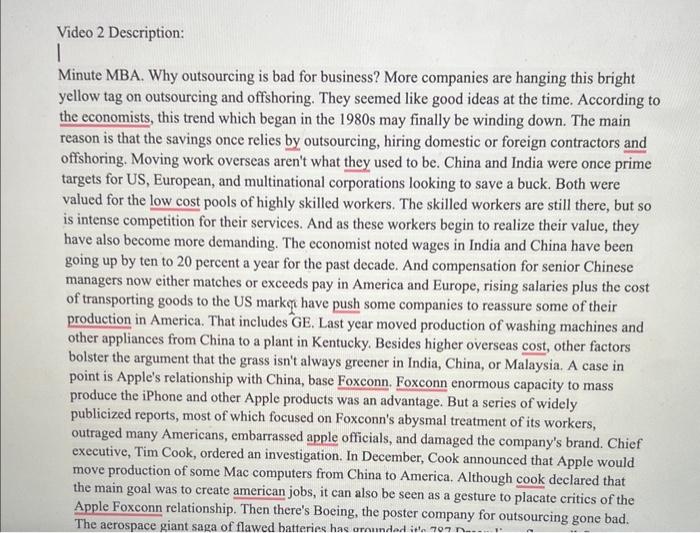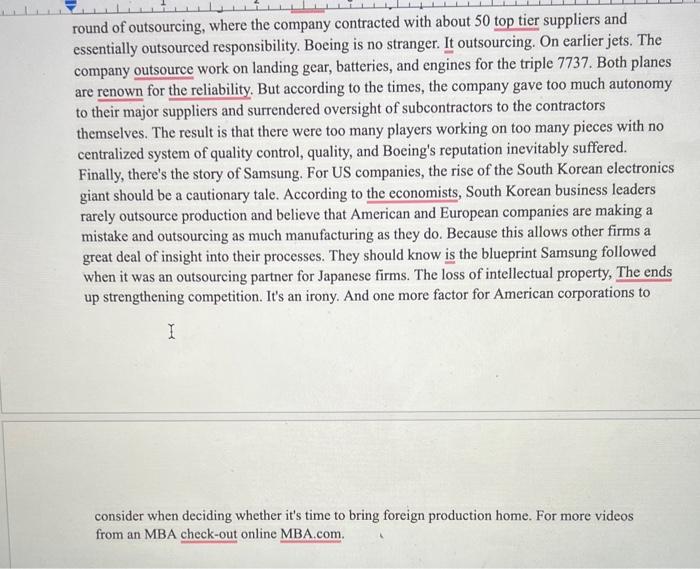Answered step by step
Verified Expert Solution
Question
1 Approved Answer
Answer the question on the first picture and the other pictures are the transcript from the videos plz Before we get into comparing viewpoints, dig
Answer the question on the first picture and the other pictures are the transcript from the videos plz 



Before we get into comparing viewpoints, dig around a bit and define both "outsourcing" and "offshoring." Are they always (or ever) the same thing? If not, how do they differ? Now, using the videos as background, and bringing in any other sources or your own personal experiences, write a solid paragraph or two about why you think outsourcing is a good or bad thing, or why it may be sometimes a good or sometimes a bad thing. Please be very clear on your position. Here are a few questions to think about, and don't feel like you have to address any or all of them. But, l'd like to stir your thinking a bit. Have you benefitted from outsourcing in any way? Has outsourcing negatively impacted you or a family member in any way? Has outsourcing strengthened or weakened a company with which you are familiar? Has outsourcing helped or harmed a community with which you are familiar? Initial posts should be at least 200 words Video one description: Did you know that outsourcing is no longer a business buzzword or jargon. Researcher is piling up about outsourcing as a useful business. Globally, outsourcing is seen as a viable solution to many operational issues as small and big companies. Here are the top five reasons by outsourcing can boost your business to great heights. Outsourcing allows you to focus in court services. Outsourcing your non-core business functions will give you more flexibility to manage the core functions of your business. So management of non port functions like call center, operations, project development, and the like, are transferred to your outsourcing partner. Finally, your company reaps all the advantages of your focus to use financial, human, and management resources to be more effective and efficient in your delivery of services. Outsourcing gives you access to high value talents and skills. If you are a startup or a small firm, you do not immediately have access to skilled enoloyees. Even big companies face the same issue as the cost labor continues to rise. Outsourcing can then become your company's friend. Filipino workforce ranks among the most globally competitive and skilled people. They are young, educated, English-speaking, skilled labor force are also not left behind in keeping pace with the rapidly evolving technology, as well as making the most value out of your investment. Officer talents, skills that these staff possess are suitable to any type of business processing. Operations. Outsourcing gives you the ability to God costs. Cost reduction is often listed as one of the main reasons companies outsource. Depen Minute MBA. Why outsourcing is bad for business? More companies are hanging this bright yellow tag on outsourcing and offshoring. They seemed like good ideas at the time. According to the economists, this trend which began in the 1980 s may finally be winding down. The main reason is that the savings once relies by outsourcing, hiring domestic or foreign contractors and offshoring. Moving work overseas aren't what they used to be. China and India were once prime targets for US, European, and multinational corporations looking to save a buck. Both were valued for the low cost pools of highly skilled workers. The skilled workers are still there, but so is intense competition for their services. And as these workers begin to realize their value, they have also become more demanding. The economist noted wages in India and China have been going up by ten to 20 percent a year for the past decade. And compensation for senior Chinese managers now either matches or exceeds pay in America and Europe, rising salaries plus the cost of transporting goods to the US markm have push some companies to reassure some of their production in America. That includes GE. Last year moved production of washing machines and other appliances from China to a plant in Kentucky. Besides higher overseas cost, other factors bolster the argument that the grass isn't always greener in India, China, or Malaysia. A case in point is Apple's relationship with China, base Foxconn. Foxconn enormous capacity to mass produce the iPhone and other Apple products was an advantage. But a series of widely publicized reports, most of which focused on Foxconn's abysmal treatment of its workers, outraged many Americans, embarrassed apple officials, and damaged the company's brand. Chief executive, Tim Cook, ordered an investigation. In December, Cook announced that Apple would move production of some Mac computers from China to America. Although cook declared that the main goal was to create american jobs, it can also be seen as a gesture to placate critics of the Apple Foxconn relationship. Then there's Boeing, the poster company for outsourcing gone bad. round of outsourcing, where the company contracted with about 50 top tier suppliers and essentially outsourced responsibility. Boeing is no stranger. It outsourcing. On earlier jets. The company outsource work on landing gear, batteries, and engines for the triple 7737. Both planes are renown for the reliability. But according to the times, the company gave too much autonomy to their major suppliers and surrendered oversight of subcontractors to the contractors themselves. The result is that there were too many players working on too many pieces with no centralized system of quality control, quality, and Boeing's reputation inevitably suffered. Finally, there's the story of Samsung. For US companies, the rise of the South Korean electronics giant should be a cautionary tale. According to the economists, South Korean business leaders rarely outsource production and believe that American and European companies are making a mistake and outsourcing as much manufacturing as they do. Because this allows other firms a great deal of insight into their processes. They should know is the blueprint Samsung followed when it was an outsourcing partner for Japanese firms. The loss of intellectual property, The ends up strengthening competition. It's an irony. And one more factor for American corporations to consider when deciding whether it's time to bring foreign production home. For more videos from an MBA check-out online MBA.com 



Step by Step Solution
There are 3 Steps involved in it
Step: 1

Get Instant Access to Expert-Tailored Solutions
See step-by-step solutions with expert insights and AI powered tools for academic success
Step: 2

Step: 3

Ace Your Homework with AI
Get the answers you need in no time with our AI-driven, step-by-step assistance
Get Started


